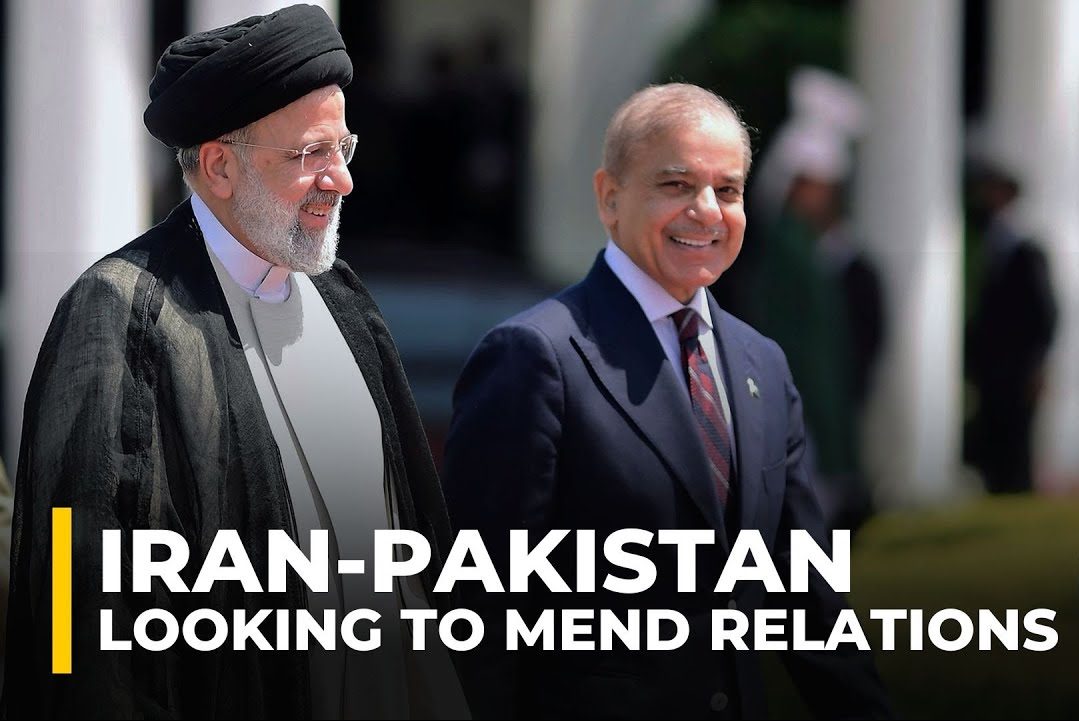President Ebrahim Raisi of Iran is visiting Pakistan for three days to discuss bilateral and regional relations, only days after Israel and Iran began strikes on each other, increasing the likelihood that the Gaza war would escalate into a regional conflict.
As the two neighbors try to mend fences after tit-for-tat missile launches in January, Raisi is set to meet with Pakistan’s prime minister, Shehbaz Sharif.
Aljazeera stated that Raisi is set to hold talks with top Pakistani leaders as the two nations aim to boost trade and resolve border issues.
Local media reports that Raisi would also meet with Pakistan’s military chief, General Asim Munir, who has considerable political and economic influence over the South Asian nation.
So, what exactly is the plan for this journey?
On Monday, Raisi touched down in Islamabad, the capital, as the two neighbors sought to reinforce their energy, border, and trade ties.
“Under its neighborhood policy, the Islamic Republic of Iran is interested in fostering relations with Pakistan,” the Iranian presidential office said on Monday. “During this visit, the government of Pakistan will be briefed on a range of issues, including energy and border concerns, as well as economic and commercial matters.”
Sunday saw a statement from Pakistan’s Ministry of Foreign Affairs, which called for a deepening of bilateral relations.
“The two sides will have a wide-ranging agenda to enhance cooperation in diverse fields including trade, connectivity, energy, agriculture, and people-to-people contacts and further strengthen Pakistan-Iran ties,” according to the document.
The statement said that during his visit to major cities including Karachi and Lahore, the Iranian president will concentrate on bilateral relations and economics.
According to a written statement provided to Al Jazeera by Mosharraf Zaidi, a partner at advisory services firm Tabadlab and a former adviser to the Foreign Ministry, Raisi’s trip is “an effort to secure an expression of support from Islamabad and Rawalpindi [military leadership] for Iran – as it stumbles deeper into a dangerous conflict with Israel “.
Zaidi claims that Iran’s strategic analysts are mindful of the fact that due to a number of internal political concerns and an increasing variety of economic demands, Pakistan is limited in its ability to engage in the ongoing battle in the Middle East.
What is the current situation with Iran and Pakistan?
The two countries have been at odds for quite some time, with Pakistan and Iran taking turns criticizing the other for laxity in dealing with terrorist groups.
Disputes near the border intensified when two children were killed in airstrikes carried out by Iran in Pakistan in January. The Iranian government-run media said that the strike targeted two Jaish al-Adl sites. In return, Pakistan demanded that Iran remove its ambassador from Tehran and launched a missile into Iranian territory.
Nonetheless, the two neighbors resolved to lessen hostilities, and immediately afterward, Tehran dispatched its top envoy to Islamabad in an effort to mend relations. In order to address the “menace of terrorism,” the two countries have resolved to collaborate, with a focus on the border area. Islamabad and Tehran had discussed combating “terrorism” before Raisi’s arrival.
There was a caretaker administration in power in Pakistan during that period. According to Muhammad Faisal, a PhD professor at the University of Technology Sydney who specializes in Pakistan’s foreign affairs, Iranians had indicated that a visit might be made to repair bridges and reestablish confidence following the election of a new administration.
For what reason do Iran and Pakistan need each other?
Despite the border tensions, Pakistani foreign policy professionals have advocated for reestablishing communication with Iran.
The border between Pakistan, Afghanistan, and India is a contentious one. According to top Pakistani official Maleeha Lodhi, “Having a normal, stable relationship with Iran has been of utmost importance for Pakistan, and it remains so.” This statement was made during the border tensions in January.
The two countries’ current bilateral trade exceeds $2 billion, and increasing it has been a priority for Islamabad and Tehran.
The two countries engage in a large-scale illicit trade of crude oil and liquefied petroleum gas (LPG), as said by Faisal, as reported by Al Jazeera. He went on to claim that Iran also supplies electricity to the Balochistan province and other border territories in Pakistan.
In May 2023, Sharif and Raisi inaugurated the inaugural border market at the Mand-Pishin border crossing.
In addition, the two neighboring countries have deep cultural and religious ties; for example, every year, tens of thousands of Shia Muslims from Pakistan go to Iran to do pilgrimage.
Zaidi of Tabadlab reports that despite the presence of 900 km (559 miles) of shared border, no significant commercial ties or interpersonal exchanges have taken place.
“Travel is limited to religious tourism, and trade occurs primarily outside the formal domain,” said he.
On the eve of his journey, the president of Iran declared that the political and economic links between his country and the United States were not on par, and he set a goal of $10 billion in bilateral trade. In August, they had established a target for bilateral commerce of $5 billion.
Iran would be able to sell natural gas to Pakistan via a pipeline, but the United States is against the plan because of the sanctions it has placed on Tehran as a result of its nuclear program.
The gas pipeline that links Iran and Pakistan will likely come up in the discussions, according to Faisal of the University of Technology in Sydney.
In light of the recent tensions between Iran and Israel, how has Pakistan responded?
One day after Iran attacked Israel, on April 14, Pakistan’s foreign ministry issued a statement calling for a de-escalation. “The consequences of the breakdown of diplomacy” were the events characterized in the statement.
The statement from the ministry said, “These also highlight the ‘grave’ implications in cases where the UN Security Council is unable to fulfill its responsibilities of maintaining international peace and security.”
The statement continued by saying that Pakistan has stressed the need for the international community to take measures to end the fighting and establish a truce in Gaza.
It is now of the utmost importance to stabilize the situation and restore calm. The letter warned that everyone should exercise extreme caution.
Since it does not recognize Israel, Pakistan has cut off any direct connection with the Jewish state.
“In recent years, there has been an increase in speculation about the possibility of pressure from GCC states on Pakistan to change its Palestine stance. Nothing, says Zaidi, points to the possibility of such a change happening soon.





